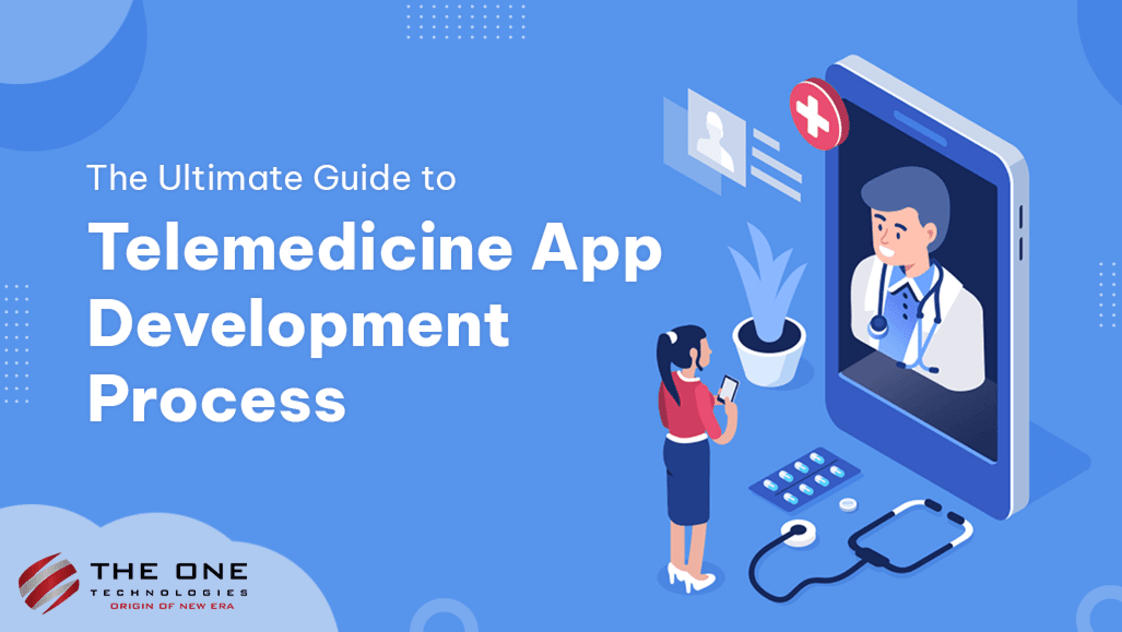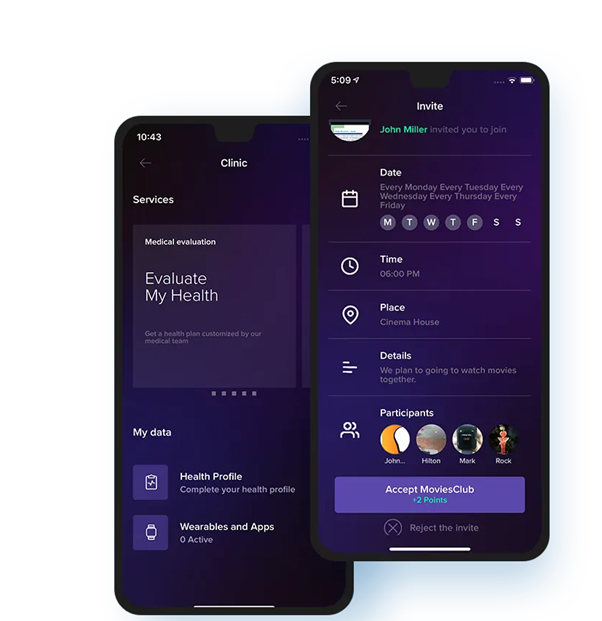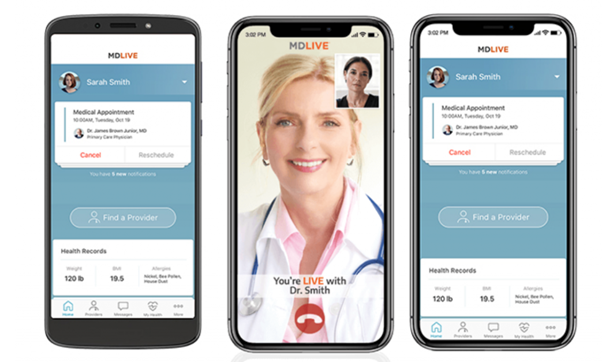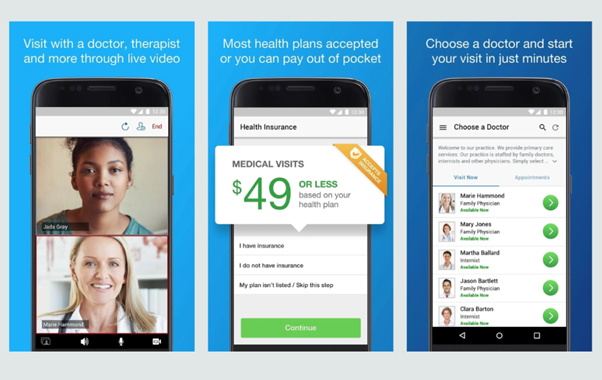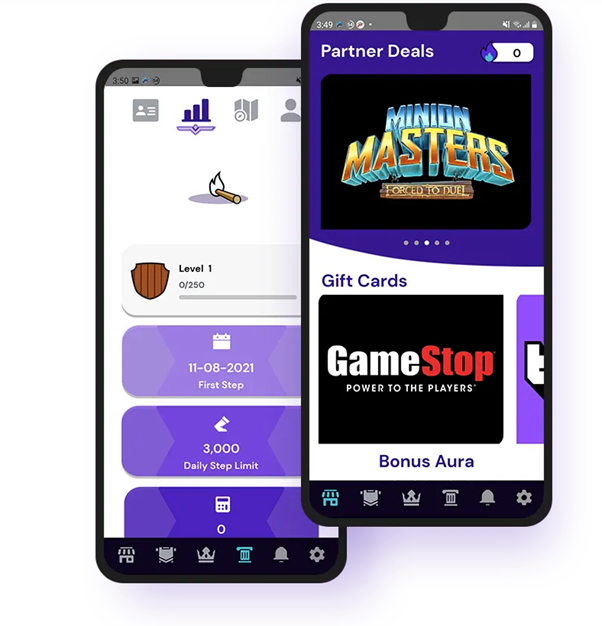The digital landscape is growing in scope, technical advancements are defining this period, and the healthcare sector is about to change significantly. Telemedicine has quickly developed into a crucial part of contemporary healthcare procedures. With the termination of geographical barriers and the increasing need for available medical services, telemedicine applications have become essential to communication between patients and healthcare providers.
This blog explores the thrilling healthcare app development industry and how it can completely transform the way healthcare is provided and received. We shall discover various prospects of telemedicine technology and reveal its advantages for medical professionals and patients. Come with us as we explore the creative possibilities of telemedicine apps and transform healthcare as we go—one virtual consultation at a time.
What are the Types of Telemedicine Apps?
- Live Video Telemedicine Apps
These apps make real-time video consultations between patients and healthcare practitioners possible. Through video conversations, patients can discuss their symptoms, seek advice from medical professionals, and even get prescriptions filled.
- Asynchronous Telemedicine Apps
These apps, also called "store-and-forward," allow users to submit medical records, including pictures, videos, and written summaries, for later review
by healthcare professionals. This is helpful for consultations in pathology, radiography, and dermatology.
- Text-Based Telemedicine Apps
Patients and healthcare professionals can text or talk thanks to these apps. Users can ask questions, describe their symptoms without making a live video call, and get medical advice.
- Remote Monitoring Apps
Apps for remote monitoring are frequently utilized for post-operative care or the management of chronic illnesses. Patients can monitor vital signs, including blood pressure, heart rate, and glucose levels, with their help, and they can share this information with their healthcare doctors for continued monitoring.
- Pharmacy and Medication Telemedicine Apps
These apps make medication delivery, prescription refills, and medication management services easier. Pharmacist consultations and online drug orders are available to users.
- EHR-Integrated Telemedicine Apps
EHR systems used by healthcare practitioners and telemedicine solutions can sometimes be integrated. This facilitates the easy exchange of patient data and optimizes the workflow in the healthcare industry.
- Tele-ICU Apps
Through video and monitoring technologies, critical healthcare experts can remotely watch and confer with patients in the ICU thanks to tele-ICU apps.
- Telerehabilitation
Technology is used in telerehabilitation to conduct clinical evaluations and therapy sessions with rehab patients. With video conferencing and webcams being used to assist in discussing symptoms and clinical progress, this typically has a significant visual component.
Features to Include in Telemedicine App Development
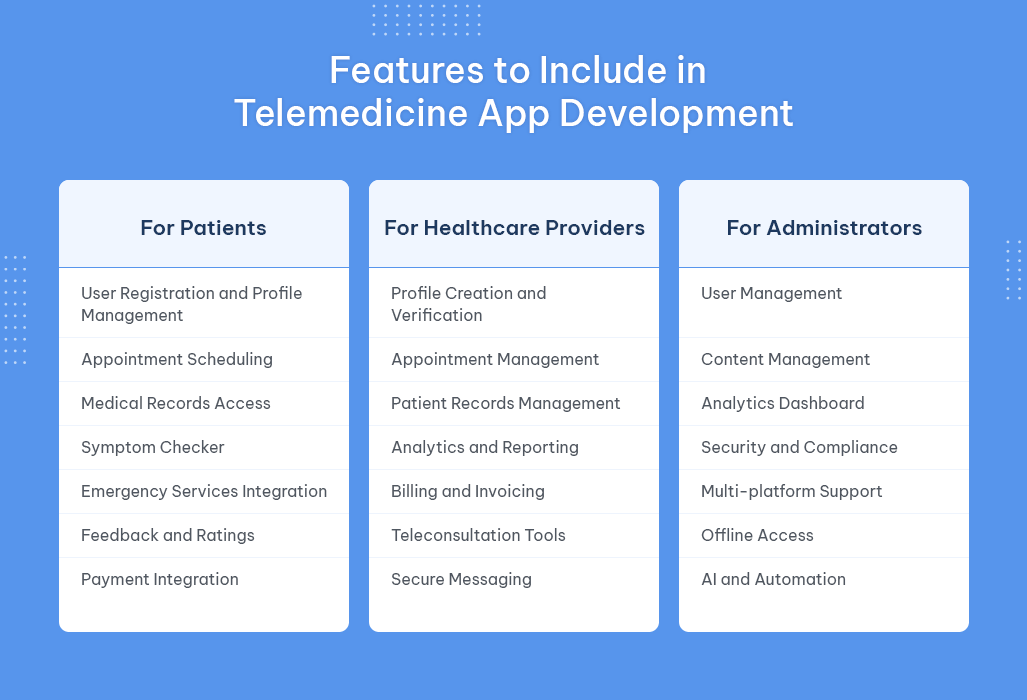
How Much Does It Cost to Build a Telemedicine App?
When building a telemedicine app, a range of factors are taken into consideration, which impacts the total cost of development. Factors affecting the cost are:
- Features
- Complexity
- Design,
- User Experience
- Third-party Integrations
- Functionality
- Development Time
A comprehensive telemedicine app may include user registration, secure login, appointment booking, in-app messaging, video conferencing, e-prescriptions, patient record management, and payment integration.
To provide a rough estimation of medical app development, a basic telemedicine app with primary functionalities could cost around $50,000 - $150,000. However, the cost could exceed $300,000 or more for a more advanced and feature-rich health and fitness app.
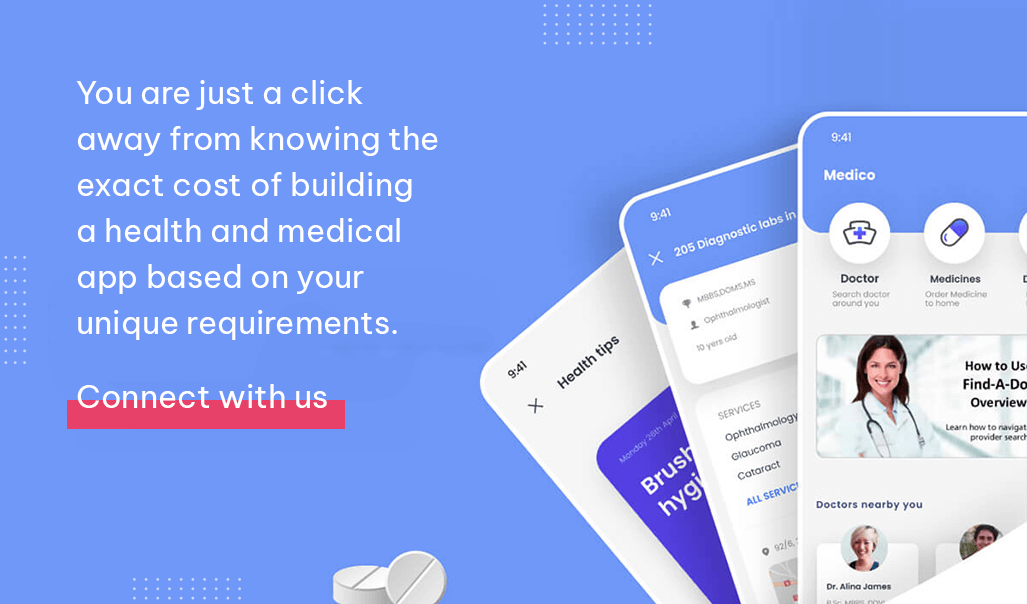
5 Things to Consider While Developing Telemedicine Apps
Here are 5 key considerations to ensure a successful and user-friendly health app development.
Understanding User Needs
Prioritizing data security and patient privacy is important while building a healthcare app. Medical and fitness apps handle private health information, so it is necessary to have strong security protections. This entails implementing robust encryption techniques, safe login procedures, and stringent user access controls.
Designing an Intuitive User Interface
User-friendliness ought to come first. Patients and healthcare professionals should be able to easily browse through the app's capabilities thanks to its user-friendly interface. You can enhance the user experience by implementing clear instructions and offering useful prompts.
Ensuring Compliance and Security
Ensuring security in healthcare applications is essential for safeguarding confidential patient information and keeping it secure. Abiding by the Health Insurance Portability and Accountability Act (HIPAA) is paramount. Healthcare apps must implement effective protection strategies such as encryption for data at rest and during transmission, access control mechanisms, and regular security reviews to maintain high-end security.
Integrating with Existing Healthcare Systems
Ensuring the app works harmoniously across multiple devices and platforms is critical for success. Patients and healthcare providers can access the application via smartphones, tablets, or desktop computers; if it functions seamlessly on all of these, it will provide maximum accessibility.
Testing for Functionality and Performance
Assessing the functionality and performance of healthcare apps is indispensable for verifying their efficacy and consistency. These apps are typically used for essential tasks such as monitoring vital signs, administering medications, and offering telemedicine services. It is imperative to conduct meticulous tests to verify that all features operate correctly. This allows examining if the app captures and displays data, sends notifications precisely, and seamlessly responds to user inputs.
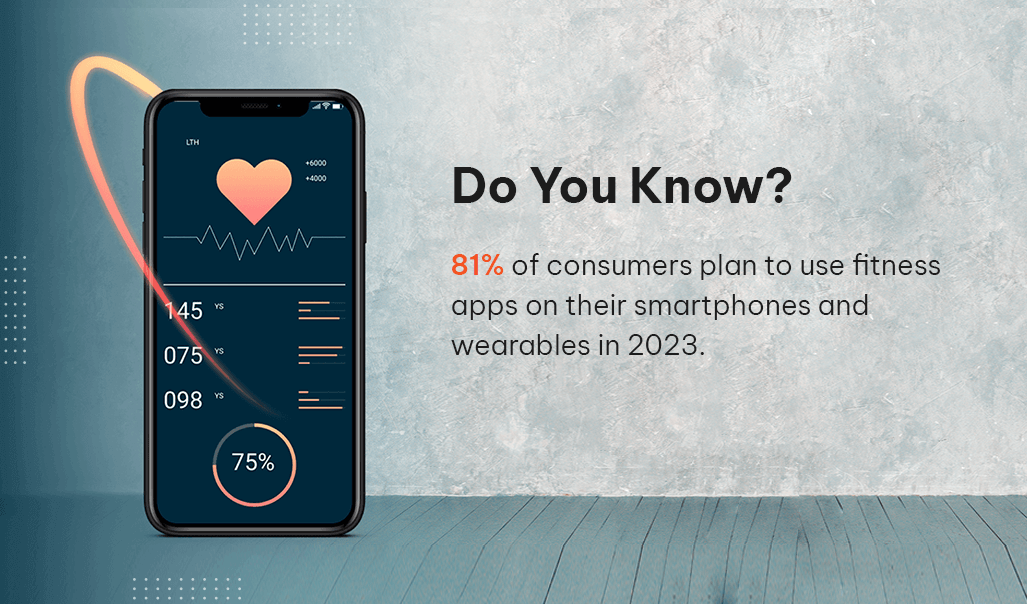
Telemedicine App Development Trends
Telemedicine and Virtual Care Platforms
Telemedicine and virtual care have revolutionized the way people access healthcare services. Web development is needed to facilitate functions such as appointment scheduling, video consultations, and secure online communication between patients and medical professionals to make these systems work.
Patient Portals and Personalized Care
Patient portals are increasingly popular, providing individuals a protected online space to access their medical records, lab results, and tailored healthcare plans. Through web development in the healthcare field, user-friendly patient portals can be created, granting people the ability to take control of their health.
Mobile-First Approach
With the increasing use of smartphones, healthcare web developers have adopted a mobile-first approach. Responsive design and mobile-friendly interfaces are essential to ensure patients and healthcare providers can conveniently access and interact with medical platforms on various devices.
Data Security and HIPAA Compliance
Safeguarding data and complying with laws like HIPAA are essential as digital healthcare systems collect and store sensitive patient information. To prevent unauthorized access to patient records and security violations, web developers in the medical field are implementing strict security measures, such as encryption, reliable authentication methods, and periodic assessments.
Machine Learning and Artificial Intelligence
The healthcare industry is undergoing a radical transformation due to the integration of AI and ML (Machine Learning). These technologies can provide invaluable insights into diagnosis, treatment options, and medication exploration by sifting through vast data repositories. Web development has opened the door to AI-driven chatbots for initial patient interactions, personalized healthcare material from intelligent recommendation engines, and predictive analytics, which can anticipate potential health risks.
Top 6 Telemedicine Apps
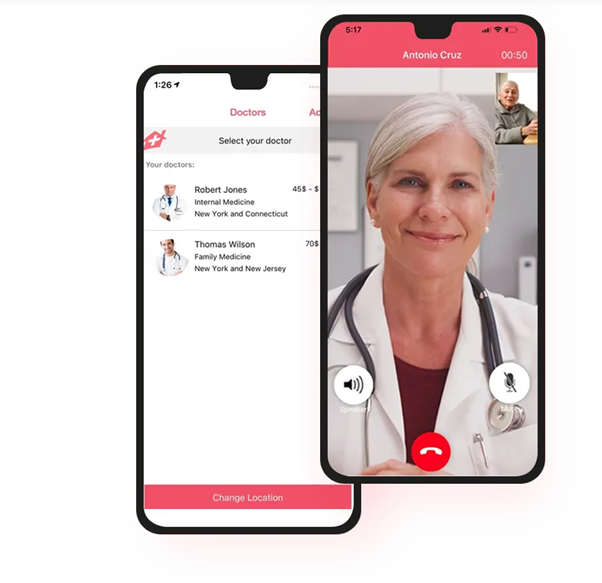
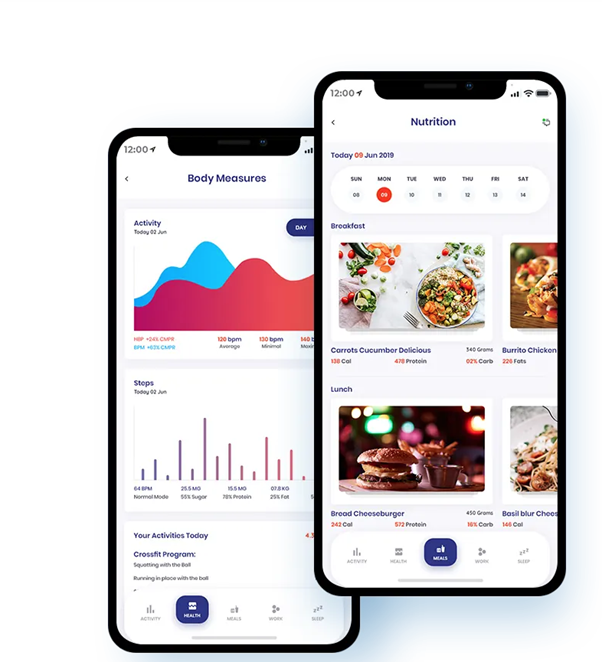
Process of Telemedicine Application Development
Understanding the Basics
Achieving success in healthcare app development necessitates a deep appreciation of the ever-changing healthcare sphere. For instance, telemedicine facilitates remote medical attention through digital mediums for consultations, patient tracking, and data management. It is imperative to understand these core principles to ensure a successful venture.
Planning and Research
Crafting the direction of the telemedicine app commences with identifying its healthcare aims. A detailed market analysis provides insight into potential opportunities and risks, facilitating decisions on target audiences and regions. To ensure successful development, you must incorporate the app's objectives, such as having a comprehensive project plan containing budgetary limitations, schedules, and essential features should be established.
Design and Development
Creating a medical and fitness app requires careful consideration of the technology stack, from programming languages to databases. Crafting front- and back-end components is paramount, harmonizing UI design with UX principles. Essential features such as appointment scheduling, video consultation tools, and data management must be integrated into the app to guarantee that it meets healthcare industry standards.
Application Testing and Quality Assurance
The importance of robust testing and quality assurance measures cannot be overstated, as they are essential in guaranteeing the dependability and safety of the app. Security testing will assess the app's protection against data breaches and malicious cyber-attacks. On the other hand, when exposed to multiple conditions, performance testing will analyze its speed, responsiveness, and scalability. Lastly, compliance testing ascertains that it complies with healthcare regulations and data privacy laws; this step is intended to identify potential issues before the app goes live.
Launching and Marketing
The introduction of the app marks the success of its developmental process. In preparation for its launch, servers and systems were configured to run the app effectively. It is essential to publish mobile applications on multiple platforms, such as Apple App Store and Google Play Store, or make them accessible online. A marketing campaign should be initiated to draw attention to the product and increase its user base. Establishing collaborations with healthcare providers and insurance companies would also strengthen its outreach, while continuous maintenance is imperative for sustained success.
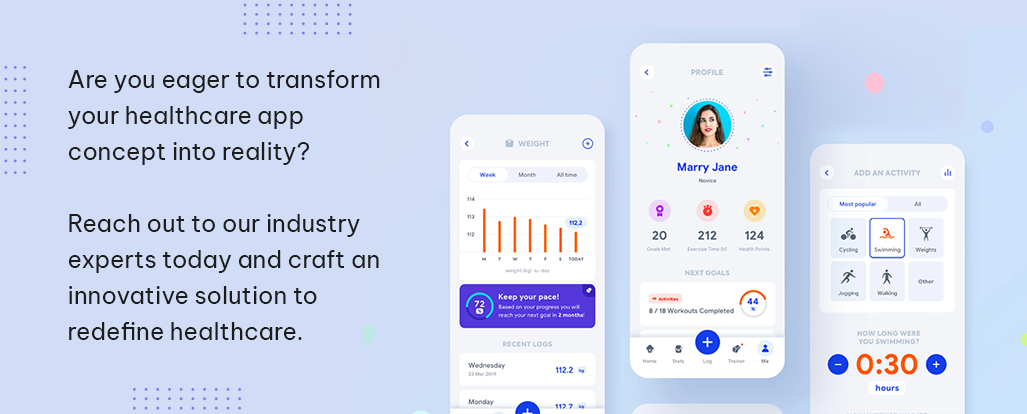
How Can You Hire a Telemedicine App Development Company?
Follow the below-mentioned 5-step process to hire a reliable telemedicine app development company to get innovative healthcare solutions in a competitive market.
Conclusion
Creating a healthcare app is a complicated process. A good telemedicine application requires several important phases, from envisioning the concept to designing and developing the software. You can proceed confidently and effortlessly through each procedure step by adhering to our comprehensive guidance. User experience, security, and scalability should always come first during development.
Now is the ideal time to start your journey toward developing a telemedicine app due to the continuously evolving demand for remote healthcare services. So, consult a leading healthcare software development company and develop creative solutions to transform the healthcare sector.



